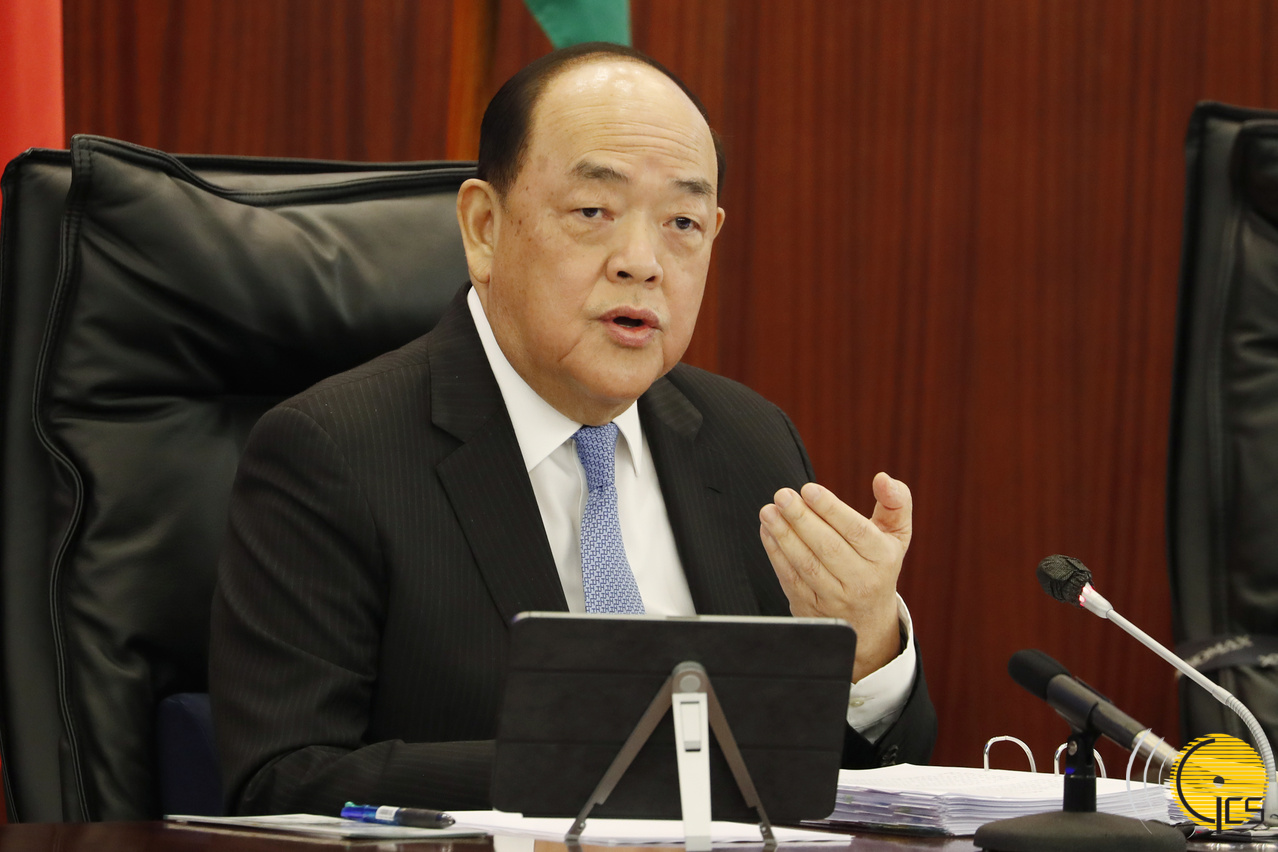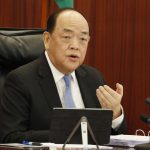 The Chief Executive, Mr Ho Iat Seng, attends a plenary session of the Legislative Assembly to answer questions raised by Legislative Assembly members concerning the Policy Address for the Fiscal Year 2022.
The Chief Executive, Mr Ho Iat Seng, attends a plenary session of the Legislative Assembly to answer questions raised by Legislative Assembly members concerning the Policy Address for the Fiscal Year 2022.
The Chief Executive, Mr Ho Iat Seng, said the Government of the Macao Special Administrative Region (MSAR) was committed to promoting nascent industries – including high and new technology, and traditional Chinese medicine – within the Guangdong-Macao Intensive Cooperation Zone, as part of Macao’s economic diversification effort.
Macao-Hengqin integration had already formed a pattern, following publication of the Master Plan of the Development of the Guangdong-Macao Intensive Cooperation Zone in Hengqin, Mr Ho said.
The Chief Executive made the comments on Wednesday (17 November) during a question-and-answer session at the Legislative Assembly, concerning the Policy Address for the Fiscal Year 2022. The title of the policy address for 2022 is “Making Concerted Efforts to Open Up New Horizons”.
During Wednesday’s session, Mr Ho disclosed more details regarding Macao’s steps for coordinated development regarding the Cooperation Zone in Hengqin.
Macao’s Second Five-Year Plan for Economic and Social Development, spanning 2021 to 2025, would be launched by the end of the year, he added. Construction of the Light Rapid Transit (LRT) line extension to Hengqin, as well as of the road network linking the University of Macau campus to the rest of Hengqin, were included in Macao’s planning, Mr Ho said.
Mr Ho noted Hengqin already had existing zoning for commercial and business areas, and housing. The next phase would be focused on revising the sub-zone planning in Hengqin, in order to support high-end and new technology, and other industries. Relevant work was being carried out in an orderly manner, said Mr Ho.
The Chief Executive went on to say that tourism was an important component and pillar of Macao’s economy. Facilitating a rebound of the local tourism sector was critical to boost the entire economic recovery, he added.
Macao and Hengqin enjoyed huge potential for cooperation on tourism, under the framework of the Cooperation Zone, Mr Ho said. Looking ahead, the two places should strengthen interactive development of the tourism industry and the MICE (meetings, incentives, conferences and exhibitions) industry. The Historic Centre of Macao, inscribed on UNESCO’s World Heritage List, and Macao’s status as a City of Gastronomy, under UNESCO’s Creative Cities Network, would be substantial advantages in this regard, noted Mr Ho.
Mr Ho additionally said sport-linked tourism would be a feature of the Cooperation Zone for Henqin. Macao’s involvement in co-organising the 15th National Games in 2025 would be a prime opportunity to advance such goal, he added.
Legislative Assembly members asked about details regarding Government effort to attract businesses and investments. The Chief Executive said a Cooperation Zone service centre had been set up in Macao, in order to serve those wishing to invest in either Macao or the Cooperation Zone.
In the future, as the policy of relaxation of customs supervision for the “first-tier” line (i.e., the port between Macao and Hengqin) and strict supervision over the second-tier line (i.e., channels between Hengqin and other regions within mainland China) was fully implemented, members of the Macao public living or working in Hengqin would enjoy even greater convenience and opportunities for professional development, said Mr Ho.
The Chief Executive also talked about detailed work for economic diversification. The Government intended – under the Urban Development Master Plan – to redevelop the land plot for the Macao Industrial Parks Development Company into an industrial sub-zone, on terms similar to those applicable to Hong Kong’s Cyberport. Relevant companies had started working on the project, and work regarding construction of a data centre and of traditional Chinese medicine facilities had been carried out progressively, said Mr Ho.
Mr Ho also mentioned work relating to promotion of partnerships between industry and academia regarding research. A first batch of 12 projects had already been stationed in a joint laboratory set up by the University of Macau (UM) and a company in Zhuhai. The Zhuhai UM Science and Technology Research Institute’s work covered specific industry-academia-research projects in relation to, respectively, smart cities, advanced materials, microelectronics, translational medicine, and traditional Chinese medicine.
The Government was devoting utmost effort to fostering development regarding integrated circuit technology, big data, artificial intelligence, the Internet of things, and other fields outlined in the Master Plan of the Development of the Guangdong-Macao Intensive Cooperation Zone in Hengqin as priorities, said Mr Ho.
Regarding development opportunities for Macao young people, Mr Ho said the Government paid great attention and gave extensive support for young people to work and gain professional experience on the mainland. The Government strove to provide local young people opportunities to work as interns in large-scale enterprises on the mainland, he said.
Currently, the threshold for Macao professionals to provide different types of services in Hengqin had been lowered, and approximately 380 people had been qualified to practice there, said Mr Ho.
Such a cross-boundary practice model helped promote free movement of talented people between Macao and Hengqin, therefore providing broader space for professional development of local young people, Mr Ho added. He called on the young people in Macao to grasp the opportunities created under the Master Plan of the Development of the Guangdong-Macao Intensive Cooperation Zone in Hengqin, in order to enhance their own competitiveness while taking part in national development.


